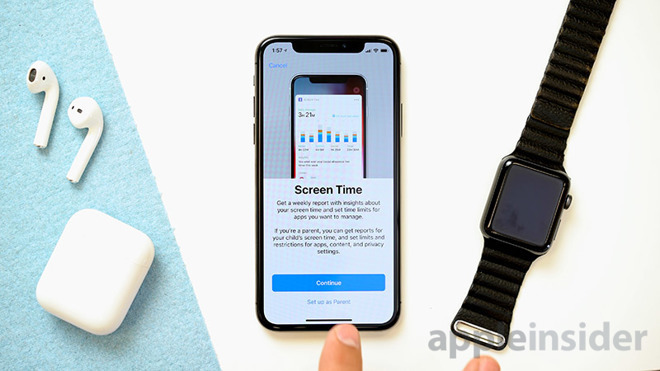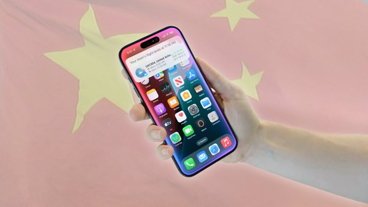Apple on Sunday issued a formal response to a New York Times report that implied the company removed a number of parental control apps from the App Store to quash competition, saying the titles in question posed a threat to user security.
In its report, The Times said Apple removed a number of screen time monitoring and parental control apps over the past year, sometimes without adequately notifying developers. The tech giant also leveled restrictions or forced material feature changes that left some titles stripped of key functionality.
Developers who provided statements to The Times suggested Apple's prohibitions were instated to put a damper on apps competing with the Screen Time feature that debuted with iOS 12. The tool includes usage monitoring and device control functions rendered redundant by certain third-party apps, the report charged.
Apple responded to the claims in a lengthy post to its Newsroom webpage, titled "The facts about parental control apps." Contradicting developer implications, Apple said the apps were removed because "they put users' privacy and security at risk."
The company's statement largely reiterates salient points from an email marketing chief Phil Schiller sent to a concerned customer on Saturday. Specifically, apps affected by the targeted takedown were found to rely on "highly invasive" Mobile Device Management (MDM) technology.
MDM integration allows deep access to a device and its stored data. As Apple notes, the technology is often used in large-scale enterprise device deployments to protect hardware and potentially sensitive information like proprietary software. Due to its inherently invasive feature set, MDM should not be employed in private sector apps like those offered up to consumers on the App Store, Apple's statement reads.
Apple said it began to investigate the use of MDM in non-enterprise apps in early 2017, an undertaking that prompted an update to the company's developer guidelines later that year. The new rules were cited in the parental control app crackdown.
Developers found to be in violation of the guidelines were given 30 days to fix the issue and submit an app update. Some acquiesced to Apple's requests, but others did not and had their wares removed as a result.
"Parents shouldn't have to trade their fears of their children's device usage for risks to privacy and security, and the App Store should not be a platform to force this choice," Apple said. "No one, except you, should have unrestricted access to manage your child's device."
Apple further denies claims that the removals are related to its own Screen Time feature.
"Apple has always supported third-party apps on the App Store that help parents manage their kids' devices," the company said. "Contrary to what The New York Times reported over the weekend, this isn't a matter of competition. It's a matter of security."
Despite Apple's explanation, developers are taking action against what they believe to be anticompetitive behavior. Two parental control apps featured in The Times' report, Kidslox and Qustodio, last week filed a complaint with the European Union's anti-competition office on allegations that Apple's forced changes had a negative impact on business. Kaspersky Lab did the same in Russia last month following the removal of its "Safe Kids" parental control app.
Music streaming service Spotify filed its own antitrust complaint against Apple with the European Commission in March, citing artificial App Store restrictions.
 Mikey Campbell
Mikey Campbell




-xl-m.jpg)


-m.jpg)






 Thomas Sibilly
Thomas Sibilly
 Wesley Hilliard
Wesley Hilliard
 Christine McKee
Christine McKee
 Amber Neely
Amber Neely
 William Gallagher
William Gallagher
 Malcolm Owen
Malcolm Owen

 Mike Wuerthele
Mike Wuerthele








27 Comments
I never installed any of these parental control apps since I was concerned about the very same thing.
The very nature of such apps is constant monitoring and I couldn't trust any of the developers to keep my data private.
That is why I've looked forward to Apple's implementation and that is why I use it without any fear of privacy breaches.
NYT did a bad job taking skeevy developers at their word without verifying claims. I expect better from them. This is the kind of bad journalism you’d normally see from Bloomberg or Business Insider.
It remains to be shown that Apple did or did not give consistent and adequate notice of the reasons why certain apps were removed. The NYT article specifically alleges that the developers couldn’t determine why their apps were being targeted.
Apple is making it clear publicly that the use of MDM in public facing apps is the problem. This is the same issue highlighted when Apple bricked enterprise apps used by Facebook and others who used enterprise APIs in their public facing apps?
Seems so.
Trying being a parent with kids who will use their iPads all day and night. Privacy is not the issue we have - it is managing their time that takes a ton of our time. Screen Time is a joke to control these scenarios - too complicated for parents to figure out and manage.
MDM works for IT departments to control their employees. As a parent, I'm the IT dept paying for these devices and I need similar ability to control the amount of time and what they can do.
Provide the warnings to the parent on privacy and let the markets decide - give us the choice to run apps like OurPact - it has been a lifesaver for our family. Apple would have done better buying OurPact instead of the complicated mess they attempted in iOS12.